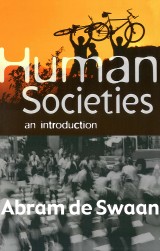Details

Human Societies
An Introduction1. Aufl.
|
16,99 € |
|
| Verlag: | Wiley |
| Format: | EPUB |
| Veröffentl.: | 03.07.2013 |
| ISBN/EAN: | 9780745666143 |
| Sprache: | englisch |
| Anzahl Seiten: | 176 |
DRM-geschütztes eBook, Sie benötigen z.B. Adobe Digital Editions und eine Adobe ID zum Lesen.
Beschreibungen
This book is a brief introduction to the study of society, which may be read without any previous knowledge of the social sciences. <p>Each chapter addresses a fundamental question about people in their various arrangements. The book begins by asking: what do people need from one another; what do they need to survive and how do these needs make them dependent upon others? Subsequent chapters deal with the ties that bind people, the expectations they entertain of one another, their means of distinguishing themselves from others, the ways they have of moulding and teaching the young, and what they believe, know and invent. De Swaan also explores the ways in which people organize their activities, from foraging bands of only a few dozen members to contemporary societies that can effectively co-ordinate a billion people or more. Human Societies traces this huge increase in the scale of social life which occurred as new forms of human co-ordination emerged: from reciprocal obligation and collective action, to markets, organizations, and states, and finally, the emerging global level of interdependence.</p> <p>This book will be essential reading for anyone who needs a brief and clear introduction to sociology in its broadest sense; it will be especially valuable to those studying the subject for the first time.</p>
1. What People Need From Each Other. <p>2. How People Are Connected To One Another.</p> <p>3. What People Expect Of One Another.</p> <p>4. How People Distinguish Themselves From One Another: Stratification.</p> <p>5. How People Form One Another: Socialization and Civilization.</p> <p>6. What People Believe, Know And Think: Orientation.</p> <p>7. How People Attune Their Efforts To One Another: Competition and Coordination.</p> <p>8. How People Perform Tasks Together: Collective Action.</p> <p>9. How People Produce For Others and Exchange Goods: Division Of Labour, Market Formation and Payment.</p> <p>10. How People Cooperate On The Basis Of Rules and Instructions: Organization.</p> <p>11. How People Form States and States Form People: State Formation And State Intervention.</p> <p>12. Globalization: Towards A Worldwide Society?.</p> <p>Further Reading.</p> <p>Index.</p>
"As an introductory text, Human Societies stands out as an exemplary work of scholarship. Professor de Swaan's approach is grounded in the best tradition of historical and institutional sociology. His style is lucid and jargon-free. His analysis is cogent and engaging throughout. His coverage extends from the micro-concerns of human relationships to the macro-issues of social change and globalization."<br /> <b>—Robert Pinker, London School of Economics</b>
<b>Professor Dr Abram de Swaan</b> is Chairman of the Amsterdam School of Social Research (ASSR), and is Chair of Sociology at the University of Amsterdam
This book is a brief introduction to the study of society, which may be read without any previous knowledge of the social sciences. <p>Each chapter addresses a fundamental question about people in their various arrangements. The book begins by asking: what do people need from one another; what do they need to survive and how do these needs make them dependent upon others? Subsequent chapters deal with the ties that bind people, the expectations they entertain of one another, their means of distinguishing themselves from others, the ways they have of moulding and teaching the young, and what they believe, know and invent. De Swaan also explores the ways in which people organize their activities, from foraging bands of only a few dozen members to contemporary societies that can effectively co-ordinate a billion people or more. Human Societies traces this huge increase in the scale of social life which occurred as new forms of human co-ordination emerged: from reciprocal obligation and collective action, to markets, organizations, and states, and finally, the emerging global level of interdependence.</p> <p>This book will be essential reading for anyone who needs a brief and clear introduction to sociology in its broadest sense; it will be especially valuable to those studying the subject for the first time.</p>
<br />

















